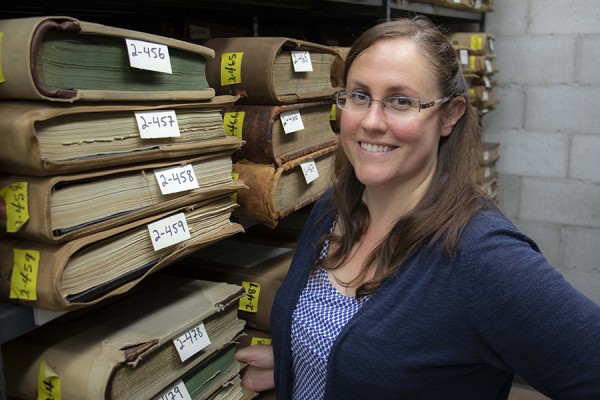 Her work as a historian led Sarah Glassford to a career as an archivist.
Her work as a historian led Sarah Glassford to a career as an archivist.
There’s an old saying that one person’s trash is another person’s treasure. Leddy Library’s new archivist, Sarah Glassford, knows that one person’s junk might also be the raw material that informs another person’s doctoral thesis.
“Sometimes the ‘junk’ in an attic or basement really is just junk,” said Dr. Glassford. “But other times it’s a treasure trove of original sources documenting people and events of the past. Old maps, diaries, meeting minutes, posters — even sewing patterns and recipes can inform research and inspire creativity.”
As a former history professor, Glassford knows how important the work of archivists is to historical scholarship.
“It’s always fun to work with students and scholarly researchers who come to the archives,” she said. “They usually arrive with some knowledge of their topic, and now want to roll up their sleeves and muck around in the original evidence, to see what more they can discover.
“Other visitors use our records as sources of inspiration. They may use a quotation, image, or idea from the past, as a jumping-off point for their own new creative product.”
Glassford holds a master’s degree in library and information science and a doctorate in Canadian history. She most recently worked as an archivist at the provincial archives of New Brunswick, and previously taught history at the University of Prince Edward Island, the University of New Brunswick (Fredericton), the University of Ottawa, and Carleton University.
In her role as archivist, Glassford will steward Leddy Library’s Archives, Rare Books and Special Collections. The collection includes institutional records of the University of Windsor and Assumption College and is also rich in community records documenting the history of the Windsor-Essex region.
“It was my work as a historian that sparked my interest in archives as a profession,” she said. “The longer I spent doing research in various archives, the more I became interested in the behind-the-scenes work that went into the neatly-labelled boxes of files I was looking through, or the challenges of preserving born-digital records. I take a quiet pride in helping to preserve fragments of the past that will inform the work of future generations of researchers.”
Beyond welcoming researchers who wish to consult the archives’ records, Glassford looks forward to working with faculty who want to integrate a local history component into their course design or teach their students archival research skills. She is also eager to connect with anyone — faculty, staff, students, or community members — interested in donating records to the archives.
For more information, contact Glassford at sarah.glassford@uwindsor.ca.
—Marcie Demmans
